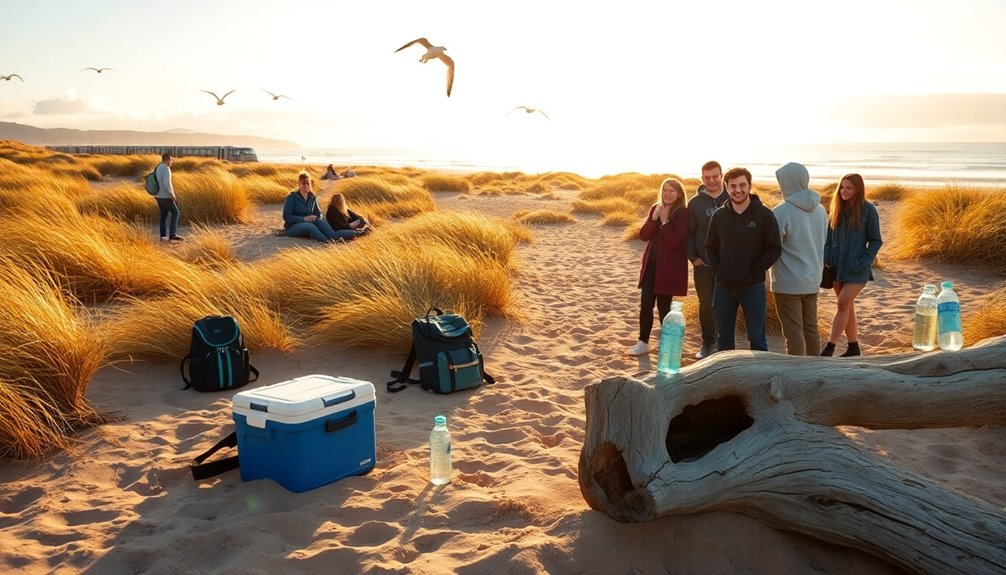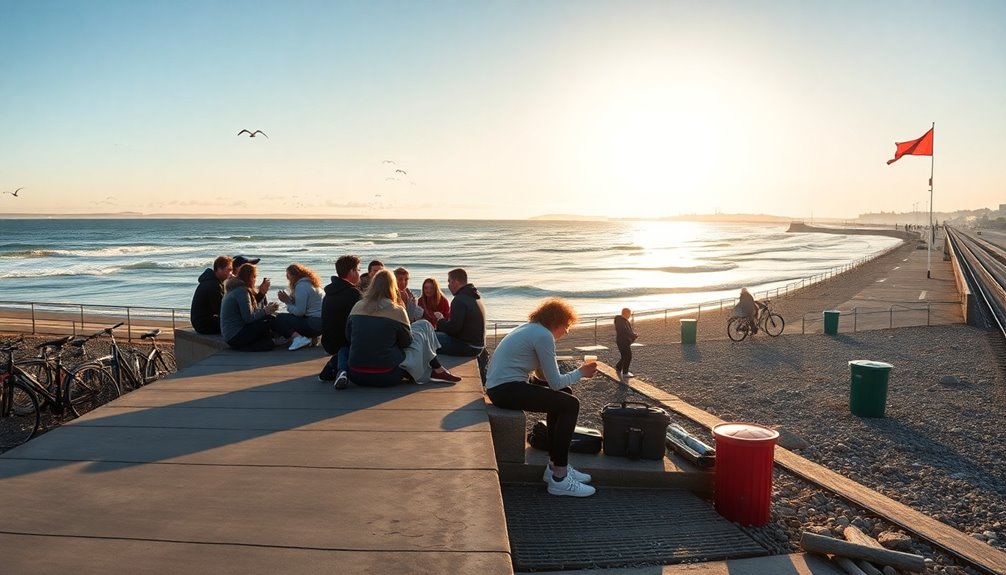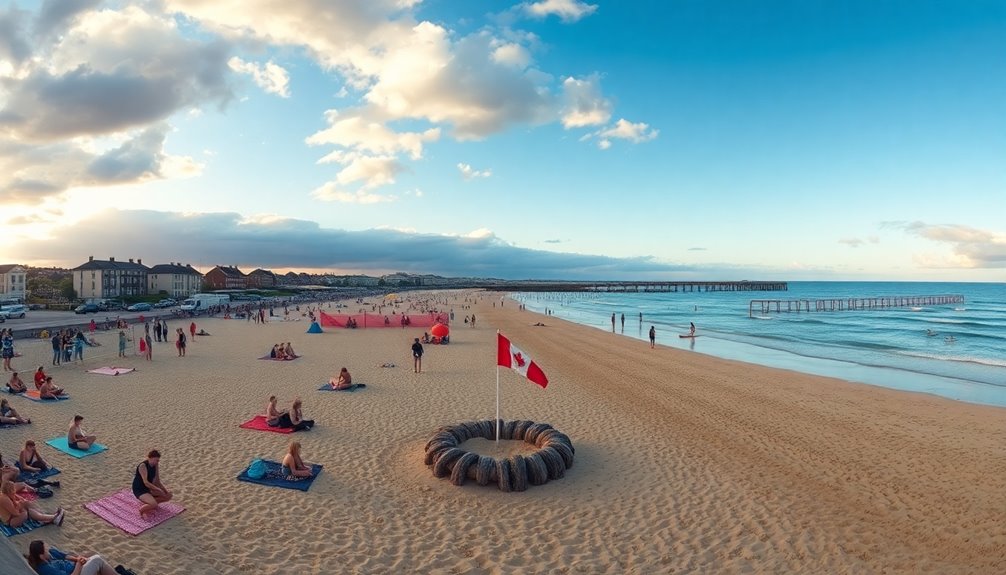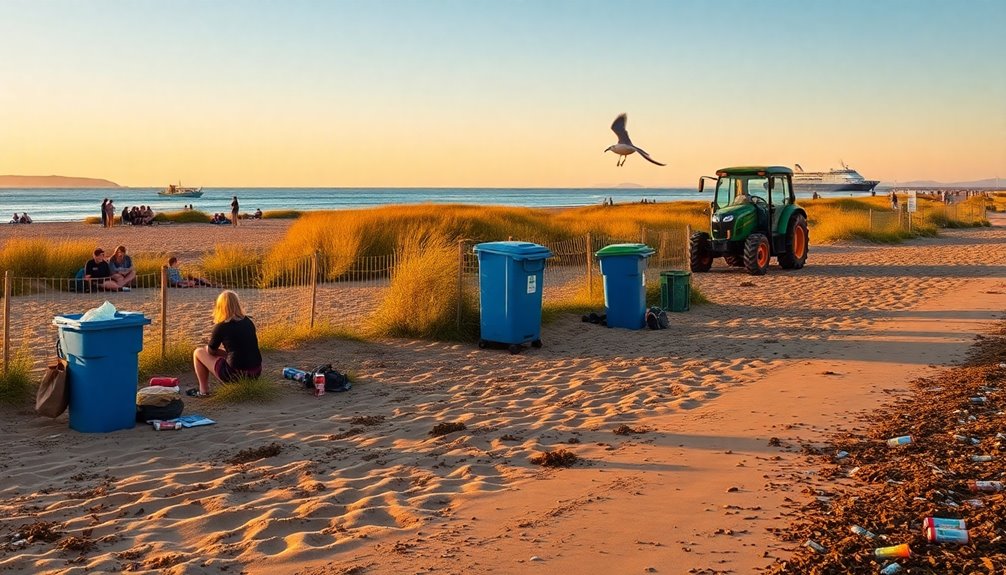
If you’re a student near Dublin, nearby beaches offer cheap, quick escapes for fresh air, social hangs, and short study breaks with scenic calm spots and picnic tables. You’ll save on travel with DART, bus or bike, but watch weather, crowds, and limited lifeguard hours. Bring basic first-aid, check tide times, and pack light to keep costs down. Beaches boost mood and focus, and there’s more practical tips and safety advice ahead.
Highlights
- Pro: Close beaches (bus, DART, bike) offer affordable, quick escapes that boost mood and social life.
- Con: Peak season crowds and noise can disrupt study time and reduce privacy.
- Pro: Sheltered spots, picnic tables, and calm areas provide productive outdoor study environments.
- Con: Tides, limited lifeguard hours, and weather risks require planning and safety precautions.
- Pro: Low-cost social activities (volleyball, bonfires, picnics) foster community but demand responsible waste management.
Why Students Love Dublin’s Nearby Beaches

Because Dublin’s beaches are so close and easy to reach, they’ve become the go-to escape for students needing fresh air and a break from studying. You’ll find a relaxed beach culture that swaps lecture halls for sandcastles, solo walks, and bonfire-style chats. You can clear your head with brisk sea air, then join mates for impromptu games or quiet reading. These shores nurture student friendships, creative bursts, and a sense of autonomy — you choose timing, pace, company. Even brief visits reset focus, boost mood, and remind you freedom’s simple: sun, sea, and friends within reach.
Cost and Transport Considerations for Students
While you’re budgeting for rent and books, getting to Dublin’s beaches shouldn’t feel like a luxury: most popular spots are reachable by bus, DART, or bike for just a few euro or a student leap card swipe. You’ll want to compare transport options — regular buses, DART trains, bike-share or carpool — and pick what fits your schedule and wallet. Pack light, bring a reusable bottle, and combine trips to save fares. Budget tips: get a monthly leap pass if you commute, hunt student discounts, travel off-peak, and plan picnic snacks. Freedom’s cheaper when you plan smart.
Safety and Accessibility for Young Travellers
Getting to the beach on a budget is great, but you’ll also want to think about safety and accessibility before you head out. You’ll appreciate beaches with clear lifeguard presence and visible emergency protocols — they let you roam with confidence. Check access for bikes, buses, and mobility needs; ramps, parking, and signage matter. Know tide times, join local alerts, and carry a basic first-aid kit. If you’re surfing or swimming, buddy up and respect warning flags. Smart choices keep your freedom alive: explore, relax, and return safely knowing you’ve planned for unexpected moments.
Study-Friendly Spots and Quiet Corners by the Sea
If you want a quiet spot to study with the sea as your backdrop, several Dublin beaches offer sheltered nooks, picnic tables, and café nearby where you can grab coffee between chapters. You’ll find study spots tucked behind dunes, on promenades, or beneath piers that buffer wind and noise. Bring headphones, a light blanket, and a compact table for laptop stability. These relaxation areas let you alternate focused work with short walks that reset concentration and lift mood. Check tide times and weather forecasts, pick a spot with Wi‑Fi or offline materials, and claim a calm patch of coast.
Social Life, Events, and Student Activities at the Beaches

You’ll find the beaches around Dublin aren’t just for sunbathing — they’re hubs for impromptu beach parties, bonfires, and group picnics that bring students together. Local clubs run regular sports like volleyball, surfing and coastal runs, so it’s easy to join in or watch a lively match. In summer and across the year there are seasonal festivals and student-focused events that turn the shoreline into a social calendar hotspot.
Beach Parties and Gatherings
Weekends on Dublin’s nearby beaches often turn from quiet sandbanks into lively student gatherings, where impromptu music, BBQs, and small bonfires create a relaxed social scene. You’ll find easy camaraderie, creative playlists, and spontaneous conversations under open skies, but you’ve got responsibilities: follow beach etiquette and respect local noise regulations to keep places open for everyone. Bring portable seating, tidy up, and use discreet lighting; plan exits and transport before dusk. If you lead a group, set clear boundaries so freedom doesn’t slip into nuisance. When you balance fun with care, beach nights feel liberating and sustainable.
Student Sports and Clubs
After a night of music and BBQs, mornings on the sand often belong to organised activity: student-run volleyball leagues, casual football kickabouts, surf sessions, and yoga groups that make the most of Dublin’s coastline. You’ll find clubs that suit every pace — competitive team sports for when you want to push hard, and laid-back beach fitness crews if you just want to move and meet people. Coaches and older students welcome newcomers, gear’s often shared, and social boards advertise weekly meets. It’s a low-cost way to stay fit, expand your circle, and own a bit more of the shoreline.
Seasonal Festivals and Events
When the seasons turn, Dublin’s beaches brim with events that stretch from chilled sunset gigs and pop-up food markets to surf competitions and family-friendly sandcastle festivals, so you’ll always find something to suit your mood. You’ll stumble on seasonal activities that mirror the city’s pulse — open-air cinema nights, beach yoga at dawn, and weekend markets selling local craft and seafood. Cultural celebrations link you to music, storytelling, and community bonfires, inviting a carefree, social vibe. These events help you meet mates, try new things, and reclaim weekends without breaking the bank or your sense of freedom.
Environmental Impact and Beach Maintenance Concerns

When you head to Dublin’s beaches with friends, remember that careless litter and overflowing bins can quickly spoil the sand and sea. Your noise and presence can also disturb nesting birds and other coastal wildlife, so keep a respectful distance and stick to marked paths. Finally, be aware that trampling and informal sand removal contribute to erosion, so use designated access points and report visible damage to local authorities.
Litter and Waste Issues
Although beaches near Dublin look inviting, litter and poor waste management quietly threaten their ecosystems and your enjoyment, from plastic fragments that harm wildlife to overflowing bins that spill onto sand. You want freedom to relax without picking through debris, so you’ll appreciate practical notes: local councils vary in litter management, collection frequency, and recycling access. Carry reusable items, bag your trash, and push for clear signage and more bins. Small habits feed bigger change — campus groups can run clean-ups and campaigns for waste reduction. Do your part, demand better services, and keep these shores welcoming for everyone.
Wildlife Disturbance Risks
Litter doesn’t just look bad — it changes how animals use the shore, and that makes human activity another pressure on local wildlife. When you bring loud gatherings, released dogs, or bright lights, shorebirds and seals alter feeding and breeding routines. You can still enjoy freedom here, but you’ll need to act responsibly: keep dogs leashed at sensitive times, avoid nesting zones, and take rubbish with you. Local groups push for wildlife protection and habitat preservation measures that balance access with care. Respecting simple rules keeps these beaches vibrant for you and the creatures that depend on them.
Erosion and Sand Loss
Because beaches are always shifting, you’ll notice patches of sand disappearing after big storms or heavy foot traffic, which can expose rocks, harm dune plants, and shrink the space for visitors and wildlife alike. You’ll want to understand that erosion isn’t just cosmetic: it alters habitats and increases flood risk. Practical coastal management balances natural dynamics with human use—soft solutions like dune restoration and planting native marram grass work with your desire for open access, while hard structures can limit freedom and change wave patterns. Support sensible erosion control measures that preserve sandy freedom without sacrificing safety or nature.
Some Questions Answered
Are There Seasonal Discounts for Student Groups at Nearby Beach Cafes?
Yes — many nearby beach cafes offer seasonal student discounts for groups, especially off-peak. You’ll find weekday or late-season deals, group menus, and occasional loyalty perks if you show student IDs. It’s smart to call ahead, ask about minimum numbers or blackout dates, and negotiate a simplified bill. These discounts let you stretch freedom-loving outings, enjoy seaside vibes affordably, and support local spots that welcome student groups.
Can International Students Bring Surfboards or Rent Gear Easily?
Yes — you can bring surfboards, but check airline and transport rules; many students just rent locally. Surfboard rentals are available at popular spots and instructors usually welcome internationals. Gear accessibility is generally good in summer, with wetsuits, boards, and lessons on offer; quieter months may limit options. If you crave freedom, plan ahead: reserve rentals, confirm storage or transit, and you’ll be riding Irish waves with minimal fuss.
Do Beaches Near Dublin Have On-Site Lockers or Phone Charging Stations?
Funny enough, you’ll rarely find on-site lockers or phone charging stations at beaches near Dublin; beach amenities are usually basic, and you’re expected to bring your own locks or portable chargers. That coincidence highlights limited infrastructure and related safety concerns — keep valuables out of sight, use waterproof pouches, and charge devices before you go. If you want secure storage, look for nearby cafés, surf schools, or community centres that offer lockers or supervised gear storage.
Are There Quiet Study Accommodation Options Within Walking Distance?
Yes — you can find quiet study accommodation within walking distance that’s ideal if you want freedom and focus. You’ll spot small guesthouses and student flats near coastal paths offering dedicated study zones, minimal noise, and flexible stays. Some indie cafés double as beach libraries during weekdays, letting you borrow or swap books. Look for places advertising quiet hours, good Wi‑Fi, and proximity to shorelines for quick restorative walks.
Is Nighttime Public Transport From Beaches Safe and Frequent for Students?
Yes — you’ll generally find nighttime safety and transport frequency reasonable from beaches near Dublin, but it varies. Buses and some late trains run into evenings, though service thins later, so plan connections. Stick to well-lit stops, travel with friends, and check timetables and real-time apps. If you crave freedom, aim for earlier departures or pre-book taxis for late returns to keep things secure and reliable.
Summing Everything Up
You’ve seen the perks and pitfalls of student-friendly beaches near Dublin — cheap trips, easy trains, quieter study nooks, but watch crowds, weather and waste. You’ll want to balance fun with responsibility: pack layers, plan transport, and respect local rules. Remember, “you reap what you sow” — take care of the sand and community and it’ll keep giving you peaceful study spots, safe swims and lively social scenes for years to come.
